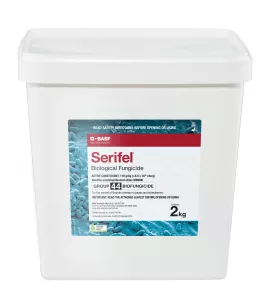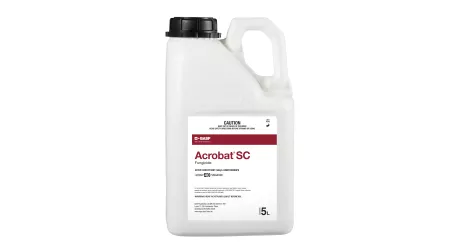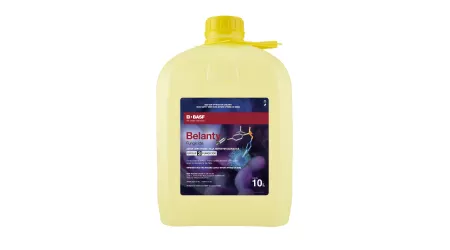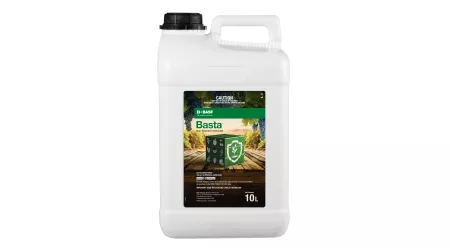Key benefits
- Unique modes of action
- Low environmental impact and toxicity
- Lower spray rate compared to other biologicals
- No cross-resistance between Serifel and conventional chemical fungicides
How it works
The active ingredient in Serifel® is bacillus amyloliquefaciens strain MBI600 (min 5.5 x 10^10 cfu/g). Serifel forms a ‘shield of protection’ against a broad spectrum of plant pathogens using three modes of action: competition for space, competition for sustenance and the production of antifungal metabolites.
When the Serifel spores are the first to occupy the limited space on the plant, they physically exclude plant pathogens from occupying the same space. Serifel then depletes the supply of nutrients available to the pathogen spores on the plant surface, causing any pathogen spores on the plant surface to die. The antifungal metabolites produced by Serifel, surfactin and iturin, penetrate pathogen cell membranes, disrupting cell function and causing cell death on the plant’s surface.
It is critical Serifel is used preventatively rather than curatively because Serifel cannot eliminate pathogen spores that have already infiltrated the plant’s surface.
Crop suitability
-
Berries
Grey mould -
Grapes
Botrytis bunch rotGrey mould -
Plant nurseries
AlternariaAnthracnoseCercospora leaf spotDowny mildewGrey mouldPowdery mildewRhizoctonia root rotRust -
Strawberry
Grey mould
Questions and Answers from the Field
-
Do biofungicides work?
Biofungicides work as effective biological control for preventing fungus in plants. When applied preventatively, BASF’s Serifel works as a ground-breaking biological alternative to other chemical modes of action. Serifel releases spores that take over space on the plant’s surface so disease spores don’t have room to grow. Serifel spores then use up nutrients, so pathogenic spores cannot access sustenance. Serifel spores also produce antifungal metabolites, which disrupt cell function in fungi to kill any remnant disease.
-
How do you treat fungal infection in grapes?
You can effectively prevent fungal infection in grape crops with BASF’s Serifel biological fungicide. Serifel is an excellent preventative against fungal infection and works by forming a protective shield on grape crops, preventing pathogens from occupying space and sustenance, as well as releasing antifungal metabolites to kill fungi before it takes hold. Serifel should be applied preventatively and can be tank-mixed with conventional fungicides at key crop stages. Serifel can also be used as a standalone spray before harvest.
-
How do you use biofungicide?
BASF’s Serifel is a highly effective biofungicide that is used by applying it preventively. Serifel should be mixed with water to ensure even dispersion in the spray tank and thorough coverage of foliage and fruit. After the first application, it’s recommended to repeat the process every three to 14-days depending on conditions. Serifel must be used preventatively because it cannot destroy pathogen spores once they have penetrated the plant’s surface.
-
What are the benefits of biofungicide?
The benefits of biofungicide such as BASF’s Serifel is that it offers unique modes of action to effectively treat fungicide as well as causing low environmental impact and toxicity. Serifel also provides the benefit of lower spray rate compared to other biologicals and there is no cross-resistance between Serifel and conventional chemical fungicides.
-
What is a natural fungicide for grey mould?
BASF’s Serifel is a natural fungicide that provides effective, ground-breaking prevention of grey mould. Serifel’s three-mode action works as a natural fungicide against grey mould by releasing spores that compete for space and sustenance on the plant’s surface, and antifungal metabolites that disrupt cell growth to stop the progression of grey mould.
-
What is the active ingredient in Serifel?
The active ingredient in Serifel biological fungicide is Bacillus amyloliquifaciens, a bacterium that works by preventing diseases including fungi and some bacteria. Bacillus amyloliquifaciens is a spore-forming, rod shaped bacterium that takes up the available space on the developing root and leaf surface, and uses the available nutrients to effectively block pathogens and provide strong protection against disease.
-
What is the biological fungicide for Botrytis?
Botrytis can be controlled using Serifel, a biological fungicide from BASF. As a biological control, Serifel offers growers the opportunity to diversify their botrytis spray programs through the season, reduce the use of chemical fungicides, and simplify harvest.
When used as part of an integrated botrytis management program, Serifel provides better resistance management with less need for the use of conventional fungicides at risk of reduced efficacy.




